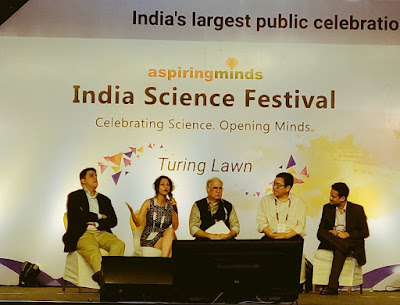The ICTD conference kicks off with marital discord between practitioners and academics

The ICTD conference for 2010 goes all Harry Potter on us, hosted by Royal Holloway, University of London. This university, started in 1886 and financially backboned substantively by Thomas Holloway who made his millions from patent medicine, is a fascinating site to hold the conference in. While we're immersed delightfully within the history of this educational space, we're confronted with the future of this relatively newly created ICTD conference space. Its a response to the persistent frustrations of the disconnect between academia and practice. It's about making "relevant" academia, to network these seemingly disparate groups in a fruitful manner and create sustainable thinking through interdisciplinary means.
So it is of little surprise that the conference launches with a panel of practitioners and moderated by Tim Unwin from Royal Holloway, University of London. In true academic self-flagellation, Tim remarks that only practitioners can truly "guide the next decade of academic research." Invited on the panel is Erik Hersman, co-founder and director of operations of Ushahidi, Anriette Esterhuysen, executive-director of the Association for Progressive Communications, Tony Salvador Senior Principal engineer, and Director of Research, Emerging Markets Platform Group, Intel Corporation, Anita Gurumurthy, IT for Change, Ken Banks, founder of kiwanja.net and creator of FrontlineSMS, and Indrajit Banerjee, Director of the Information Society Division, UNESCO. They were invited to speak their mind on what they think should be researched on in the near future, look deeply into certain issues and question certain dominant assumptions in the field. Of course, as predicted, the debate starts of with the usual practitioner-academic debate, with an underlying bias of making the "practitioner" very current, reflexive, insightful and "close" to the beneficiaries. Academics however, need a new PR agent apparently as they're viewed as parasitical creatures, feeding off on the "brain food" of practitioners as Anriette states. Banerjee, an ex-academic fuels this further with his comment that "“academics are talking to themselves while development is out there." Of course, there is some noise on who is this "practitioner" anyway? Aren't all academics, if genuinely effective, are practitioners too ? - as such, all "good theory is good practice too," as Anita states. So is that really true?
While this ritual perhaps is essential, given the role of rituals in general as markers that indicate that we're all part of this community that shares common tensions that at once divide and unite at the same time, there were more interesting points that were brought up by this panel, namely from Erik, a technologist who astutely asks why do we pigeonhole technologies as tools for development? Its like saying Mozilla Firefox is for development just because it's being used by emerging market demographics! So why do we naturalize certain tools as “empowerment tools” and does this really have a particular advantage for the ICTD field or does it long term do more damage as we exoticise typical tools and thereby create barriers on intergrating "exotic" populations into the typical user-interfacing group?
fodder for thought for sure...



Comments
Post a Comment